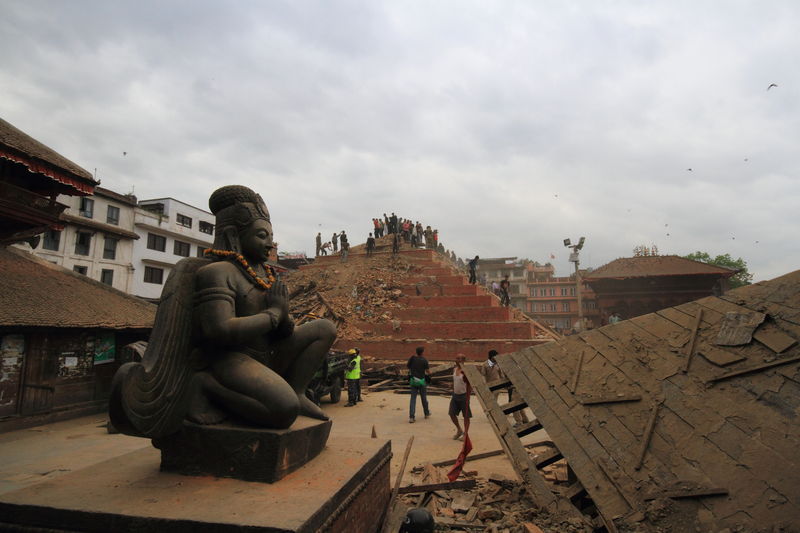Stories about Nepal from April, 2006
Nepal: Role of political parties
The challenges for the political parties in Nepal has increased. Bahas on the role of the parties and other stakeholders in the changing political scenario.
Nepal: Getting the democracy working
Voices of sceptics rise. United We Blog! on “…celebrate the victory of people where the people ‘talked and showed’ they are still skeptical on politicians’ commitment to constituent assembly and republic.”
Nepal: MPs and legal status
Legal News From Nepal on the legal status of the MPs in Nepal in the context of the changing political environment.
Nepal: What it means for South Asia
Pickled Politics on what the current events in Nepal mean for the rest of South Asia. “An insurgency has forced an autocratic ruler to give power back to the people. What if others try the same in their countries? I bet President Musharraf is apprehensive.”
Nepal: Treading cautiously on democratic grounds
After almost three weeks of protest, King Gyanendra of Nepal has agreed to restore parliament. The King had dissolved the lower house of the Parliament in 2002 because the then Prime Minister Sher Bahadur Deuba's government had apparently failed in the peacetalks with the Maoists . Events unfold in Nepal...
Nepal Revolution: Victory
The king has accepted the seven party alliance's roadmap.
Nepal: Maoists and the King
Democracy For Nepal on the reaction of Maoists to the political developments in Nepal.
Nepal: Understanding India's Stand
Nepali Netbook on India's stand on the situation in Nepal – “History is instructive here. Remember the Delhi Compromise of 1951 under which Jawahar Lal Nehru constructed the platform for King Tribhuvan, B.P. Koirala and Mohan Sumshere Rana to work out their differences?”
Nepal: Release by South Asia Forum for Human Rights
Drishtipat has a post with a release by the South Asia Forum for Human Rights on the developments in Nepal and the duties of various stakeholders - “It will not satisfy the demand for the establishment of a true democracy in the country, for the fulfillment of which the nation...
Nepal: Who is to blame?
Even as the revolution in Nepal unfolds, Bahas> asks if this is the time for reconciliation or confrontation – “Nepalese political parties are equally responsible as the king Gyanendra for the present state of Nepal. After 1990, the political parties badly misgoverned the country, forced Maoists to abandon the present...
Nepal: As Monarchy dies a death
Amardeep does a great job of collating links on the fate of Nepal even as Monarchy seems destined to end.
Nepal: Update from the streets
SerendipityYouCity provides an update on the situation in Nepal by publishing a mail from a director of a boarding school -“It’s 2 o’clock in the morning and curfew has started again in Kathmandu until 8 o’clock this evening. We just finished a round of picking up as many street kids...
Nepal Revolution: Showdown
The king is nowhere close to seeing the light.
Nepal: Youth and democracy
Samudaya.org has a report on a gather of non-aligned youth meeting to discuss Nepal's state – “participants discussed the significant role young people can play, and resolved to form an independent youth/ student coalition that will dispatch humanitarian aid and play the role of a watch dog body.”
Nepal: Restoring the legislature
As Nepal prepares itself for some form of democracy, the King grants audience to the Chief Justice in Nepal to discuss legal matters pertaining to restore the legislature says Legal News From Nepal.
Nepal: Choices and Revolution
United We Blog! on the choices before Nepal - “Nepali people are in a historical juncture to decide on what they want: constitutional monarchy or a republican Nepal”
Nepal: Revolution and International Relations
More photographs of protest from Nepal at Democracy For Nepal and Nepali Netbook comments on the apparent changing face of the King's diplomacy.
Nepal: Dissent and Blogs in Nepal
Photographs of dissent and protest at United We Blog! and Online Journalism Review covers Dinesh Wagle's talk at UCLA.
Nepal: New Year and Politics
Even as the New Year starts in Nepal, Nepali Netbook discusses the relationship between India and Nepal as the country appears to move towards democracy.
Nepal: Political Developments
Bahas comments on Nepal's move from Monarchy to democracy - “King Gyanendra has called upon all political parties to join in a dialogue, which the King has always advocated, to bear the responsibility of and contribute towards activating the multiparty democratic polity.”
Revolution In Nepal: Monarchy On Its Way Out
The movement has turned into a revolution.

